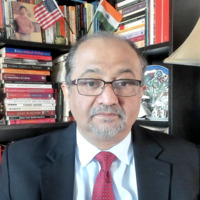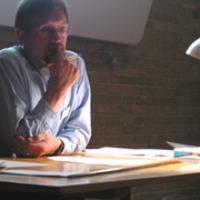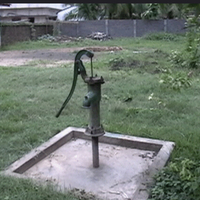Drafts by Vaios Papanagnou
In my PhD thesis I advance a critical understanding of change and continuity in social media driv... more In my PhD thesis I advance a critical understanding of change and continuity in social media driven professional journalism; one that is grounded on a major discursive contradiction, namely that journalists embrace both the networking logic of social media and the critique of its civic shortcomings, in order to represent journalism as an institution of reformed and civic-minded networked action.
Papers by Vaios Papanagnou
In Capitalism’s Conscience: 200 Years of the Guardian, editor Des Freedman brings together contri... more In Capitalism’s Conscience: 200 Years of the Guardian, editor Des Freedman brings together contributors on the newspaper’s bicentenary to offer a critical look at its recent and remote past, focusing particularly on its liberal values, institutional continuity and its political position. In exploring the paper’s ambivalent relationship with capitalism and the political Left, the book offers a forceful intervention in current debates within British progressive politics, writes Vaios Papanagnou. Capitalism’s Conscience: 200 Years of the Guardian. Des Freedman (ed.). Pluto Press. 2021

This thesis explores the influence of social media on institutional journalism. In particular, it... more This thesis explores the influence of social media on institutional journalism. In particular, it addresses the question of how journalists understand their practices, identities, and relationships as social media dominate their routines and activities in networked newsrooms. A large body of literature understands the introduction of social media in newsrooms as generating change and hybridity in the practice of journalism, while on the counter side, other research emphasises the elements of continuity that persist as relations of power and control are replicated in journalistic institutions. I demonstrate that this theoretical and empirical binary cannot productively capture and explain the interrelated processes of journalistic change and continuity, especially with respect to how journalists themselves reflexively negotiate the new contradictions of their profession. In order to transcend the aforementioned limitation, I develop an eclectic argument which highlights elements of b...
This article by LSE student Vaios Papanagnou Actor David Cromer walks into the stalls of the Alme... more This article by LSE student Vaios Papanagnou Actor David Cromer walks into the stalls of the Almeida theatre with one hand raised way above his head, holding a mobile phone. He comes in from the audience entrance and looks like he could too be sitting next to us, a man in his late 40s, casually dressed. He stands right in front of the first row of seats, showing the phone to the audience without speaking. We understand that this is the time for us to silence our own phones. He then says “This play is called Our Town. It was written by Thornton Wilder; directed by David Cromer” and, as he recites the first lines from the play he also acts in as the narrating Stage Manager, he still holds the phone in his hands.
What is wrong with the Greek media
LSE Phd researcher Vaios Papanagnou reviews a new report on Media Policy and Independent Journali... more LSE Phd researcher Vaios Papanagnou reviews a new report on Media Policy and Independent Journalism in Greece and draws an analysis of the state of the country’s journalism.

Journalistic Relations and Values in the Networked Era: A Case Study of The Guardian
Journalism Practice, 2023
In this article, I enquire into the ways that journalists negotiate their relationships, now that... more In this article, I enquire into the ways that journalists negotiate their relationships, now that social media dominate the practices of journalistic newsrooms. Drawing on a Discourse Theory framework, I view journalism as a symbolic practice that is constituted through the discourse of journalists. I draw additionally on pragmatic sociology in order to approach journalists as reflexive practitioners who ground their agreements with others on a plurality of moral values. Studying the case of British news organisation The Guardian and analysing a series of newsroom interviews, I show how journalists develop a series of qualifications in order to negotiate their relationships. My findings demonstrate that journalists have indeed expanded the range of their interlocutors. This shift is associated with the inculcation of journalists with the networking logic of social media. Journalists, however, criticise social media as hostile platforms that confine people within their social circles, as carriers of unreliable journalism, and as profit-driven publishers. I claim that this contradiction allows the journalists to connect with others as representatives of an institution, which, unlike social media, upholds its civic commitments. Nonetheless, by attaching themselves to the market-friendly logic of social networking journalists are exposed to market heteronomy.

Journalism, 2021
In this article, I enquire into the ways that journalists understand their identities and values ... more In this article, I enquire into the ways that journalists understand their identities and values now that social media dominate the routines of networked newsrooms. My approach is grounded on a Discourse Theory framework within which journalism emerges as a symbolic practice constituted through the discourse of its practitioners. Drawing additionally on pragmatic sociology, I understand journalists as reflexive practitioners who discursively attribute value to various orders of worth in order to evaluate their own identities. Taking the British news organisation The Guardian as my case study, my analysis of ten newsroom interviews demonstrates how journalists develop a series of evaluations in order to identify themselves. My findings confirm a shift in the ways that journalists evaluate themselves, which is today associated with a new valorisation of networking. This shift towards networking, however, does not destroy long-standing journalistic values. It is ultimately their institutional identities that journalists re-invent through social media, and it is according to their institutional expertise that they evaluate themselves as professionals. In conclusion, I argue that, whilst journalists reaffirm their disdain for the financial rewards of the market, by embracing social media networking they expose themselves to the influence of capitalist markets.
Books by Vaios Papanagnou
How Social Media has Transformed Journalism: The Guardian’s Digital Turning Point and Its Aftermath
Palgrave Macmillan, 2025
This book explores the influence of social media on the transformation of institutional journalis... more This book explores the influence of social media on the transformation of institutional journalism. Grounded on a case study of The Guardian in the UK, the work is an in-depth look at how a leading news organisation navigated the challenges of the social media era. Drawing on interviews with Guardian journalists, Papanagnou demonstrates that the major change that social media effected on journalism has been the inculcation of journalists with the logic of branding. Journalists now actively brand themselves and their organisations as authoritative voices on public affairs; they emphasise their expertise in the stories they share across platforms, leveraging their reputations to establish credibility and connect with like-minded audiences.











Uploads
Drafts by Vaios Papanagnou
Papers by Vaios Papanagnou
Books by Vaios Papanagnou